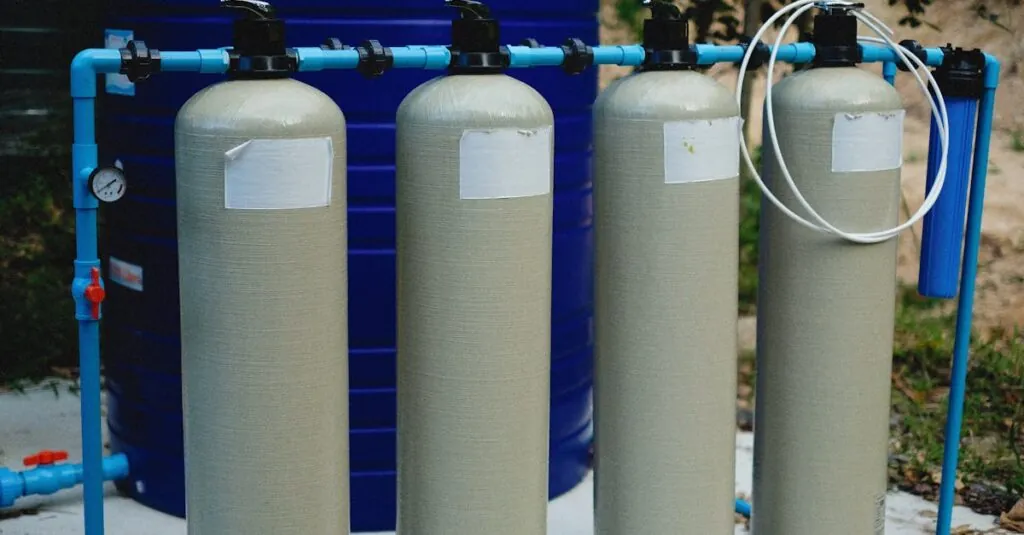Table of Contents
ToggleWater is life, but what if that life comes with a side of mystery? If you’ve ever taken a sip and wondered if that strange taste is from the tap or last week’s pizza, you’re not alone. Enter the water filtration system—a superhero in disguise, ready to save your taste buds and possibly your health.
These nifty devices don’t just filter out impurities; they turn your average H2O into a refreshing elixir. Imagine sipping crystal-clear water that’s cleaner than your last attempt at cooking. With a water filtration system, you can wave goodbye to unwanted contaminants and hello to hydration that’s as pure as your intentions on a Monday morning. So why settle for anything less than the best?
Overview of Water Filtration Systems
Water filtration systems play a crucial role in ensuring safe and clean drinking water. These systems effectively remove contaminants such as bacteria, chlorine, sediment, and heavy metals. Numerous types of filtration methods exist, including activated carbon, reverse osmosis, and UV purification. Each method offers unique advantages, catering to various needs and preferences.
Activated carbon filters excel at improving taste and odor by trapping impurities. They are often used in countertop units and pitcher filters. For more comprehensive filtration, reverse osmosis systems utilize a multi-stage process that removes a wide range of contaminants. These systems can be installed under sinks and provide high-quality water.
UV purification stands out for its ability to kill microorganisms without adding chemicals. It’s especially beneficial in areas where waterborne diseases are prevalent. Users often choose between these methods based on specific water quality issues and personal preferences.
Investing in a water filtration system enhances hydration significantly. Cleaner water contributes to overall health by supporting digestion and nutrient absorption. Many options are available at different price points, making it accessible for families and individuals alike. Choosing the right system depends on factors such as water source, budget, and desired outcomes.
Regular maintenance ensures optimal performance of water filtration systems. Replacing filters at recommended intervals maximizes efficiency and effectiveness. Homeowners should follow manufacturer guidelines to maintain water quality and maximize lifespan.
Types of Water Filtration Systems
Water filtration systems come in various types, each designed to address specific needs and water quality issues. Understanding these types helps in selecting the right system for enhancing drinking water.
Activated Carbon Filters
Activated carbon filters excel at removing taste and odor from drinking water. These filters use a bed of activated carbon to absorb impurities, including chlorine and common chemicals. They typically require replacement every 6 to 12 months to maintain effectiveness. Ideal for improving the aesthetic quality of water, these systems are affordable and easy to install. Communities often favor them for their simplicity and minimal maintenance requirements.
Reverse Osmosis Systems
Reverse osmosis systems provide comprehensive filtration by pushing water through a semi-permeable membrane. This process removes contaminants such as lead, arsenic, and nitrates. Typically designed for home use, these systems come with a storage tank for filtered water. Maintenance involves changing the membrane and pre-filters every 2 to 3 years for optimal performance. Many homeowners choose reverse osmosis for peace of mind regarding drinking water quality.
UV Filters
UV filters utilize ultraviolet light to eliminate harmful microorganisms from water. This technology disrupts the DNA of bacteria, viruses, and protozoa effectively. Unlike other systems, UV filters do not rely on chemicals or change the taste of water. Regular bulb replacement every 12 months ensures continued effectiveness. Areas with high risks of waterborne diseases often benefit from these systems for their safety and reliability.
Benefits of Using a Water Filtration System
Water filtration systems offer numerous advantages, significantly enhancing the quality of drinking water and promoting better health.
Improved Water Quality
Filtration systems excel in removing contaminants such as chlorine, heavy metals, and sediments. Activated carbon filters specifically target chemicals that affect taste and odor. Reverse osmosis systems provide comprehensive purification, stripping away a wide array of impurities. Enhanced water quality leads to improved hydration, making water more appealing to consume. Clear, clean water encourages increased daily intake. Installing a filtration system ensures access to safe drinking water, contributing to overall wellness.
Health Advantages
Health benefits associated with filtered water include reduced exposure to dangerous contaminants. Regular consumption of purified water aids in digestive health and skin improvement. Removing chlorine and other chemicals minimizes potential health risks linked to long-term exposure. Filtration also eliminates harmful microorganisms, protecting vulnerable populations such as children and the elderly. Access to clean water supports hydration, promoting better physical performance and cognitive function. With reduced impurities, everyday hydration becomes a healthier choice.
Choosing the Right Water Filtration System
Choosing a water filtration system requires careful consideration of various factors to ensure optimal performance and satisfaction.
Factors to Consider
Water source significantly influences the choice of a filtration system. Identifying whether the water comes from a well, municipal supply, or natural source provides guidance on filtration needs. Contaminants present in the water play a crucial role. Assessing the specific impurities, such as chlorine, heavy metals, or bacteria, determines the type of filtration required. Budget constraints also impact choices. Some systems, like activated carbon filters, offer affordability, while reverse osmosis systems may require a higher initial investment. Maintenance expectations are equally important. Regular filter replacements prolong system effectiveness, thus ensuring ongoing protection.
Popular Brands and Models
Several brands dominate the water filtration market, each offering various models tailored to different needs. Brita stands out with its affordable pitchers and faucet-mounted systems, providing convenient options for everyday use. Aquenox is recognized for robust reverse osmosis systems, ideal for comprehensive filtration in households concerned about water quality. PUR excels in delivering effective faucet filters, combining simplicity with reliability for quick installation. For ultraviolet solutions, the VIQUA brand offers advanced units suitable for effectively eliminating microorganisms. Researching these popular brands helps consumers make informed decisions based on features and specifications that align with their specific filtration needs.
Maintenance and Longevity
Maintaining a water filtration system is crucial for ensuring its efficiency and lifespan. Regularly changing filters prevents the buildup of contaminants, which can significantly compromise performance. Most filters require replacement every 6 to 12 months, depending on usage and water quality.
Monitoring water flow rates serves as an excellent indicator of filter condition. A noticeable decrease in flow may signal the need for filter replacement. Performing routine checks on hoses and connections also helps identify leaks or wear, contributing to overall system integrity.
Cleaning the system on a scheduled basis aids in extending longevity. Many systems benefit from disinfecting components to remove any build-up or biofilm, especially in areas with high mineral content or biological presence.
Not only does proper maintenance enhance performance, but it also improves water quality. Investing time in upkeep ensures the filtration process remains effective in removing impurities. This commitment to maintenance also minimizes repair costs associated with neglect or failure.
Documentation of maintenance activities is beneficial. Keeping track of filter changes and system inspections provides insights into performance trends and aids future decisions regarding upgrades or replacements.
For those in high-demand households, considering advanced filtration systems could prove advantageous. Systems like reverse osmosis or UV filtration often require more frequent maintenance than simpler activated carbon filters, yet they deliver superior quality.
Ultimately, prioritizing maintenance enhances the system’s lifespan and guarantees access to clean, safe drinking water. A dedicated approach to upkeep can significantly impact health and hydration, making the effort worthwhile for consumers focused on improving water quality.
Conclusion
Investing in a water filtration system is a smart choice for anyone looking to improve their drinking water quality. With various options available each offering unique benefits it’s easier than ever to find a solution that fits individual needs. Regular maintenance ensures these systems perform at their best providing clean and safe water for the whole family.
By prioritizing water filtration households can enjoy better hydration and overall health. The right system not only enhances taste but also protects against harmful contaminants. Whether opting for activated carbon filters or advanced UV solutions making an informed decision can lead to a significant improvement in daily water consumption and wellness.







